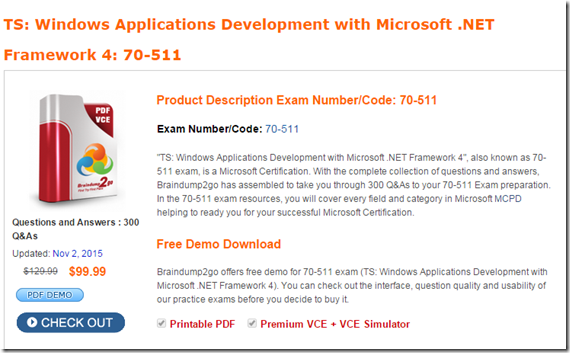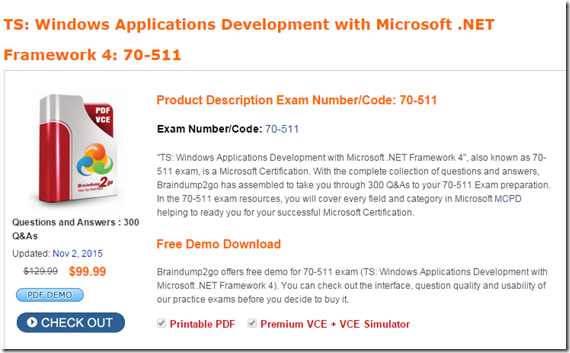MICROSOFT NEWS: 70-511 Exam Questions has been Updated Today! Get Latest 70-511 VCE and 70-511 PDF Instantly! Welcome to Download the Newest Braindump2go 70-511 VCE&70-511 PDF Dumps: http://www.braindump2go.com/70-511.html (300 Q&As)
Braindump2go New Released Microsoft 70-511 Practice Tests Sample Questions Free Download! 100% Same Questions with Actual 70-511 Exam! Guaranteed 100% Pass!
Exam Code: 70-511
Exam Name: TS: Windows Applications Development with Microsoft .NET Framework 4
Certification Provider: Microsoft
Corresponding Certifications: MCPD, MCPD: Windows Developer 4, MCTS, MCTS: Microsoft .NET Framework 4, Windows Applications
70-511 Dumps PDF,70-511 PDF,70-511 VCE,70-511 eBook,70-511 Study Guide,70-511 Certification,70-511 Exam Questions,70-511 Book,70-511 Dump,70-511 eBook PDF,70-511 Exam Preparation,70-511 Dumps Free,70-511 Braindumps,70-511 Practice Tests,70-511 Practice Exam,70-511 Practice Test Free,70-511 TS: Windows Applications Development with Microsoft .NET Framework 4

QUESTION 131
You use Microsoft .NET Framework 4 to create a Windows Presentation Foundation (WPF) application.
You want to add an audio player that plays .wav or .mp3 files when the user clicks a button.
You plan to store the name of the file to a variable named SoundFilePath.
You need to ensure that when a user clicks the button, the file provided by SoundFilePath plays. What should you do?
A. Write the following code segment in the button onclick event.
Dim player As New System.Media.SoundPlayer(SoundFilePath)
player.Play()
B. Write the following code segment in the button onclick event.
Dim player As New MediaPlayer()
player.Open(New URI(SoundFilePath), UriKind.Relative)
player.Play()
C. Use the following code segment from the PlaySound() Win32 API function and call the
PlaySound function in the button onclick event.
<sysimport(dll : = “winmm.dll”)>
Public Shared Function PlaySound(SoundFilePath As [String],
Module As Long, dwFlags As
Long) As Long
End Function
D. Reference the Microsoft.DirectX Dynamic Link Libraries.
Use the following code segment in the button onclick event.
Dim song As Audio = New Song (SoundFilePath)
song.CurrentPosition B song.Duration
song.Play()
Answer: B
QUESTION 132
You use Microsoft .NET Framework 4 to create a Windows Presentation Foundation (WPF) application.
You add a custom command as a resource.
The key of the command is saveCommand.
You write the following code fragment. (Line numbers are included for reference only.)
01 <Canvas>
03 <Button>
05 </Button>
06 </Canvas>
You need to ensure that saveCommand is executed when the user clicks the Button control.
What should you do?
A. Insert the following code fragment at line 04.
<Button.Comrtiand>
<StaticResource ResourrceKey=”saveComr[iand” />
</Button.Command>
B. Insert the following code fragment at line 04.
<Button.CommandBindings>
<ConrniandBinding Command=”{StaticResource saveCommand}” />
</Button.CommandBindings>
C. Insert the following code fragment at line 02.
<Canvas.CommandBindings>
<CommandBinding Command=”{StaticResource saveConmand)” />
</Canvas.CommandBindings>
Replace line 03 with the following code fragment.
<Button CommandTarget=”{Binding RelativeSource={RelativeSource Self),
Path=Parent}”>
D. Insert the following code fragment at line 02.
<Canvas.Commandsxndings>
<CommandBinding Command=”{StaticResource saveCommand}” />
</Canvas.CommandBindings>
Replace line 03 with the following code fragment.
<Button CommandParameter=”{Binding RelativeSource=
{RelativeSource Self), Path=Parent>”>
Answer: A
QUESTION 133
You use Microsoft Visual Studio 2010 and Microsoft .NET Framework 4 to create a Windows Presentation Foundation (WPF) application.
You write the following code fragment to bind a customer object to several controls in a window.
<TextBox Text=”{Binding Path=CustomerName}” Name=”textBoxl” />
When the application executes, you receive the following error message:
“System.Windows.Data Error: 35:
BindingExpression path error: ‘CustomerName’ property not found on ‘object’ “Customer” (HashCode=22613453)’
BindingExpression:Path=CustomerName; DataItem=’Customer’ (HashCode=22613453);
target element is ‘TextBox’ (Name=’textBoxl’) target property is ‘Text’ (type ‘String’)”
You need to identify the source of the error.
What should you do?
A. Use a Trace object.
B. Use a Debug object.
C. Use the WPF Visualizer.
D. Use a PresentationTraceSources object.
Answer: D
QUESTION 134
You use Microsoft Visual Studio 2010 and Microsoft .NET Framework 4 to create a Windows Presentation Foundation (WPF) application.
The application contains a custom control that is used to display customer Information.
You discover that the custom control is not rendering correctly.
You need to identify the WPF element that is causing the issue.
What should you do?
A. Start the application in release mode.
Place a breakpoint at the main entry point of the application.
Use the debugger to step through the application code.
B. Start the application in debug mode.
Place a breakpoint at the main entry point of the application.
Use the WPF Tree Visualizer tool.
C. Enable IntelliTrace and configure Visual Studio to generate a trace log.
Start the application in debug mode.
D. Enable IntelliTrace and configure Visual Studio to generate a trace log.
Start the application by double-clicking the executable file (.exe).
Answer: B
QUESTION 135
You are developing an XBAP application for your company intranet.
During several development iterations, you manually copy the working executable, application, and deployment manifest files to the test Web server.
You create an HTML file that has a hyperlink to the deployment manifest that you use for testing. During the next iteration, you enhance the XBAP application by making changes to the application.
When you use the hyperlink to the deployment manifest to test the deployment, you do not see the changes.
You need to ensure that the changes you make are visible when you test the deployment from your machine.
What should you do?
A. Restart Microsoft Internet Information Services (IIS).
Then click the Install hyperlink again.
B. Open a Visual Studio command prompt and run mage-cc.
Then click the Install hyperlink again.
C. Delete the application, deployment, and executable files from the Web server.
Then rebuild the XBAP solution and manually copy the same files from the project bin
directory to the Web server and click the Install hyperlink again.
D. Delete the application, deployment, and executable files from the Web server.
Then recopy the same files from the project bin directory to the Web server, restart IIS, and
click the Install hyperlink again.
Answer: B
QUESTION 136
You are developing a Windows Presentation Foundation (WPF) application by using Microsoft Visual Studio 2010.
While testing the application, you discover that a control is not positioned properly within a canvas.
You need to view the Dependency properties of the control at run time.
Which tool should you use?
A. Disassembly Window
B. Locals List
C. Watch List
D. WPF Tree Visualizer
Answer: D
QUESTION 137
You use Microsoft .NET Framework 4 to create a Windows application.
You use ClickOnce technology to install the application on computers that run Windows 7 with User Access Control (UAC) enabled.
The application requires access to environment variables on each computer.
You need to ensure that users who do not have administrative permissions can install the application.
Which deployment method should you use?
A. Start from Web.
B. Install from Web.
C. Start from network share.
D. Install from network share.
Answer: D
QUESTION 138
You use Microsoft Visual Studio 2010 and Microsoft .NET Framework 4 to create a Windows Presentation Foundation (WPF) application.
The application includes a function that is triggered by filling out a form and by clicking a button.
Currently, the application is tested manually.
You need to create an automated and iterative process to test the application.
What should you do?
A. Use IntelliTrace.
B. Use UISpy.exe to extract the user interface (UI) Information.
Then, use MSTest.exe.
C. Use classes in the System.Windows.Automation and System.Windows.Automation.
Text namespaces.
D. Use the Action Recording methodology to record the user interface (UI) actions.
Then, use MSTest.exe.
Answer: C
QUESTION 139
You are developing a Windows Presentation Foundation (WPF) application.
The application is for commercial use and requires a valid license key to be entered.
You create a project type of Class Library that contains the code to validate license keys.
You need to ensure that the user enters a valid license key during installation of the software. Which deployment should reference the class library?
A. ClickOnce
B. Setup Project
C. XBAP
D. XCopy
Answer: D
QUESTION 140
You use Microsoft .NET Framework 4 to create an application.
The application contains a partially trusted client assembly and a server assembly.
You create a custom sandboxed application domain.
You need to ensure that the application can be executed in a partial-trust environment.
What should you do?
A. Apply the following attribute to the server assembly.
<Assembly: AllowPartiallyTrustedCallers
(ParcialTcustVisibilityLevel-VisibleToAllHosts)>
B. Apply the following attribute to the server assembly.
<Assembly: AllowPartiallyTrustedCallers
(PartialTrustVislbilityLevel-NotVisibleByDefault)>
C. Apply the following attribute to the client assembly.
<Assembly: AllowPartiallyTrustedCallers
(PartialTrustVisibilityLevel=VisibleToAllHosts)>
D. Apply the following attribute to the client assembly.
<Assembly: AllowPartiallyTrustedCallers
(PartialTruscVisibilityLevel=NotVisibleByDefault)>
Answer: B
Instant Download Braindump2go New Released Microsoft 70-511 Exam Dumps PDF & VCE! Enjoy 1 year Free Updation! 100% Exam Pass Guaranteed Or Full Money Back!

FREE DOWNLOAD: NEW UPDATED 70-511 PDF Dumps & 70-511 VCE Dumps from Braindump2go: http://www.braindump2go.com/70-511.html (300 Q&A)